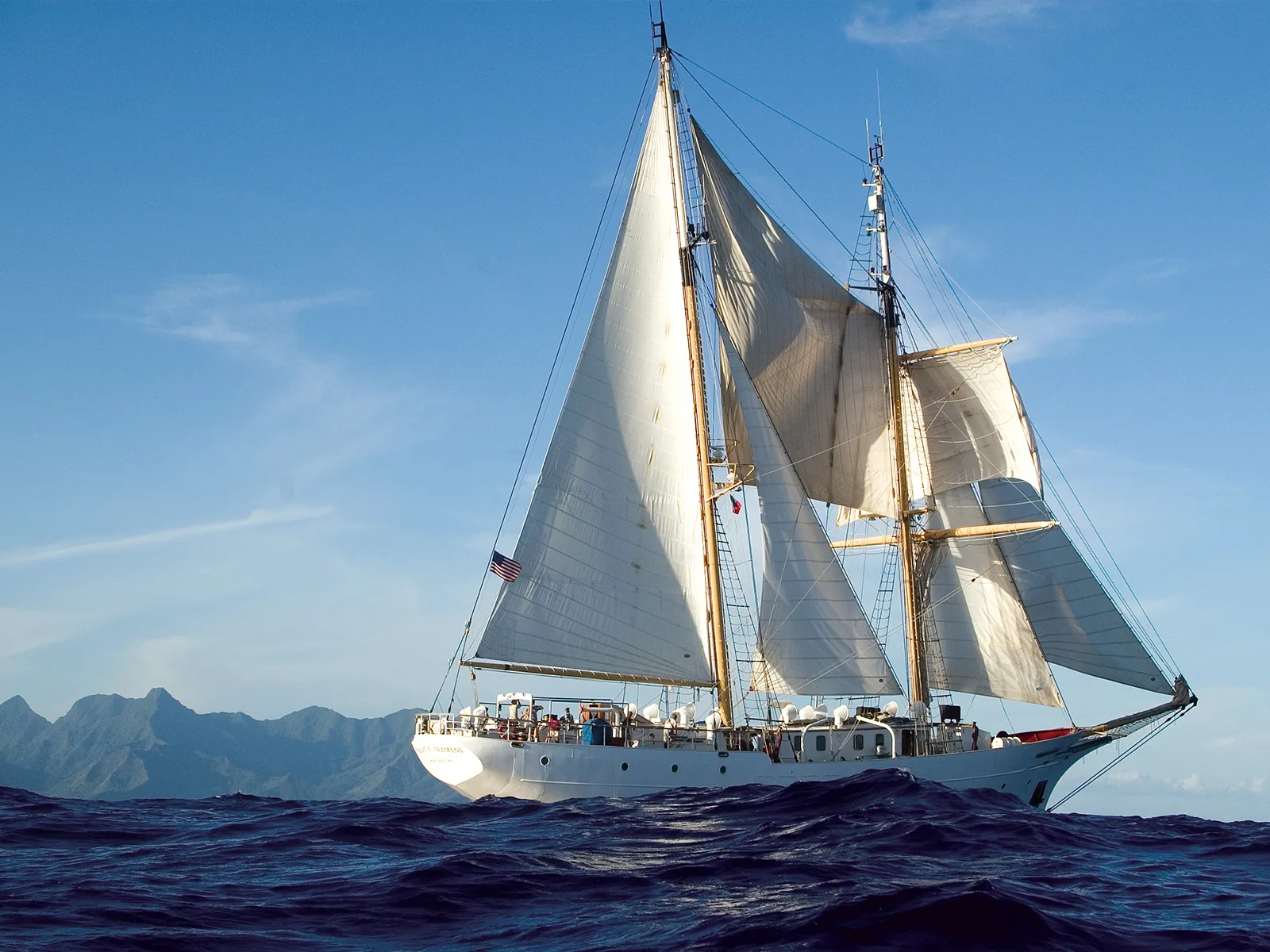Programs Blog
Inadequacy and Other Common Seabirds

Ship’s Log
Current Position
38°32.072’S, 179°43.963’E
Ship’s Heading and Speed
220.4° at 5.4 kts
Weather
mostly overcast, fair wind
Over the course of our voyage, we as students are taking on more and more responsibility for the operations of the ship. From log book entries to sail handling, our on-deck duties increase as direct guidance and instruction from our watch officers decrease.
We’ve moved well into phase two of the ship handling progression, where each six-hour watch is characterized by taking turns at shadowing our watch officer and assuming more of a leadership position among our respective student watch groups. Soon, we’ll be ramping that up into the third phase, with our watch officers only available for questions. For some, it feels a little too soon.
As I shadowed Rebecca this morning, B-watch completed two gybes to heave to for the morning science deployment. Ease and downrig the preventer. Don’t forget to notify the galley! Standby to gybe, hands to the main sheet. (Except I did all that backwards.) Two full turns to the—(left? No, we’re on a port tack.) to the RIGHT. Haul away on the main sheet. (Keep asking questions. Beam reach? Broad reach?) Pass the stays’ls and the jib. (Second guess yourself.) To starboard! (Not centerline at all.)
In the meantime ease the main sheet. The winch did what?! (Concern and confusion!) Strike the jib! And sheet in the stays’ls. (Struggle.) Now we’re on a starboard tack. Notify the galley, we’re gybing again. (You could’ve done that before.) Ask basically the same questions as before. The second gybe is mostly the opposite, but slightly not, and therefore different. Ease the jib, except it’s been taken in, because winch.
Despite the north northwest gusts at a Beaufort force 4, I feel somewhat windless, flapping hard just to stay out of the water. I envy the albatross with its broad wingspan, soaring over the waves and barely ever beating on the wind. They always seem to know where they are going, and how to get there. They’ve become a symbol of self-assuredness and mastery to me, both of which have flown far out of sight. Feelings of inadequacy, and the performance stress that sits high in your lungs, are familiar to me, and to many of us. They send me to the many places in life I’ve felt the same way, and it can be a steep spiral down. Here on the downspin, we find our fears and failures. That feeling is about doubting the many ways in which you perform—socially, intellectually, physically, and so on. On this sailing school vessel, each is tested. Most days, you pass with flying colors. Other days, you fall short. You forget to do the readings for class. You dangle uselessly from the main stays’l sheet. You take a lab practical feeling woefully underprepared, and hope that one of the three microorganisms you labeled copepod actually is a copepod. (These are all things I did today.)
On these days, you sit with your failures. On these days, you sink. But failures make bad company. So my recommendation is, sit with your failures on one side, and a friend on the other. “Thanks, D. I need the affirmation today.” Thank you Derek, for the helm-side reassurance. Thank you George, for sharing the madness. Thank you Amelia, for a study session on solidarity. Acts of friendship, acts of support, maintain us on any sea. They cannot change where you rise and fall, up a swell, down. But from where you sit, they lift your eyes to the horizon, flat and distant, constant, sure. There flies an albatross. There we point our bow. And I have determined that I am on course.
– Dylan Kennedy, B-Watch, UC Berkeley
Recent Posts from the Ships
- Ocean Classroom 2024-A collaborative high school program with Proctor Academy
- Collaborations and Long-term Commitments: SEA’s Caribbean Reef Program Sets a Course for Coastal Programs that Compliment Shipboard Experiences.
- Sea Education Association students prepare for life underway using state of the art nautical simulation from Wartsila Corporation.
- SEA Writer 2022, Magazines From the Summer SEA Quest Students
- Technology@SEA: Upgrades Allow Insight into Ocean Depths
Programs
- Gap Year
- Ocean Exploration
- High School
- Science at SEA
- SEA Expedition
- SEAScape
- Pre-College
- Proctor Ocean Classroom
- Protecting the Phoenix Islands
- SPICE
- Stanford@SEA
- Undergraduate
- Climate and Society
- Climate Change and Coastal Resilience
- Coral Reef Conservation
- Marine Biodiversity and Conservation
- MBL
- Ocean Exploration: Plastics
- Ocean Policy: Marine Protected Areas
- Oceans and Climate
- Pacific Reef Expedition
- The Global Ocean: Hawai'i
- The Global Ocean: New Zealand